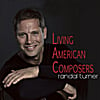 |
| Philip Glass, Martina Arroyo, Joyce DiDonato and Gerald Finley at 2009 Opera News awards. [Photo by Dario Acost] |
Was there any doubt that we'd be celebrating the 75th birthday today of the great American composer Philip Glass? We regularly feature his work on this site, including the recent production of "Les Enfants Terribles" with barihunk Timothy McDevitt and soprano Jessica Cates showing off their bodies after training at the gym for the ballet/opera; Barihunks Matthew Worth and Christopher Temporelli in Orphée at the Virginia Opera (more on that below); Lots of coverage of Hydrogen Jukebox at the Ft. Worth Opera including some great shirtless pictures of barihunks Dan Kempson and Justin Hopkins; Lots of video of his operas, including the ability to watch Kepler in its entirety with Austrian barihunk Martin Achrainer.
Profile (born Jan. 31, 1937, Baltimore, Md., U.S.) American composer of innovative instrumental, vocal, and operatic music. Glass studied flute as a boy and enrolled at age 15 at the University of Chicago, where he studied mathematics and philosophy and graduated in 1956.
Philip Glass is a prolific and widely-respected American composer of innovative, vocal and operatic music. He work consistently uses repetitive structures and is often minimalistic. Glass studied math and philosophy before pursuing music at the Julliard School. His opera Satyagraha (1980) tells the story of Mahatma Gandhi's life. The Metropolitan Opera commissioned The Voyage in 1992.
 |
| Barihunk Philip Cutlip recorded Orphee |
His interest in atonal music drew him on to study composition at the Juilliard School of Music (M.S., 1962) in New York City and then to Paris to study under Nadia Boulanger. His acquaintance there with the Indian sitarist Ravi Shankar decisively affected Glass's compositional style, and he temporarily jettisoned such traditional formal qualities as harmony, tempo, and melody in his music. Instead he began creating ensemble pieces in a monotonous and repetitive style; these works consisted of a series of syncopated rhythms ingeniously contracted or extended within a stable diatonic structure. Such minimalist music, played by a small ensemble using electronically amplified keyboard and wind instruments, earned Glass a small but enthusiastic following in New York City by the late 1960s.
Glass's opera Einstein on the Beach (1976), composed in collaboration with Robert Wilson, earned him broader acclaim; this work showed a renewed interest in classical Western harmonic elements, though his interest in startling rhythmic and melodic changes remained the work's most dramatic feature. Glass's opera Satyagraha (1980) was a more authentically “operatic” portrayal of incidents from the early life of Mohandas K. Gandhi. In this work, the dronelike repetition of symmetrical sequences of chords attained a haunting and hypnotic power well attuned to the religio-spiritual themes of the libretto, adapted from the Hindu scripture the Bhagavadgt. The opera The Voyage (1992) had mixed reviews, but the fact that it had been commissioned by the New York Metropolitan Opera (to commemorate the 500th anniversary of Christopher Columbus' arrival in the Americas) confirmed Glass's growing acceptance by the classical-music establishment.
[Excerpted from © Encyclopædia Britannica]
 |
| Matthew Worth (L) as Orphée at Virginia Opera; Jeffrey Lentz (R) as Heurtebise (Preston Gannaway,The Virginian-Pilot) |
The large cast had no weaknesses. First among equals was Matthew Worth as Orphée, using a powerful and rich baritone to great effect as the tormented poet who struggles to find meaning in his life and art. His performance conveyed both the strengths and weaknesses of the character, and did so in a sympathetic manner that carried the audience along on Orphée’s journey.
Remaining Norfolk performances are 7:30 p.m. Wednesday, 8 p.m. Friday and 2:30 p.m. Sunday. 623-1223 or 866-673-7282; www.vaopera.org
CONTACT US AT Barihunks@gmail.com















































